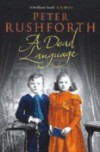|
Book Review
Too much cake
Benjamin Markovits
There are a number of things that happen to people that novels rarely document. One of them, oddly enough, is the effect on the mind of reading lots of novels. There are exceptions, of course. Don Quixote might be the most famous: the story of a man who, fired by adventure stories, goes out to seek adventure. Or the tale of Paolo and Francesca in Dante's Inferno, which describes the punishment of a couple who fall in love while reading about love. But these don't quite do justice to what I have in mind. They are examples of the way that books change people by making them do things. But books also change people by making them do nothing at all - merely by informing our sense of the world and subtly altering relations with it.
 |
A Dead Language
Peter Rushforth |
This, really, was the subject of Peter Rushforth's long-awaited second novel, Pinkerton's Sister. It came out 25 years after his first, Kindergarten, which had been rapturously received. Pinkerton's Sister seemed to justify the wait - by weight, if nothing else. It might have been called Reading. Its heroine, Alice Pinkerton, is the spinster daughter of wealthy suburban New Yorkers. She reads, as Dickens once said, for life; and her obsession with books (with the Brontës and Shakespeare and Edgar Allen Poe and Tennyson, and so on) comes across, publicly, as a kind of madness, for which her small-minded neighbours hold her up as a curious exhibit. A Dead Language is the second in the series; it will also be the last - Rushforth died in 2005. It tells the Pinkerton story from the point of view of Alice's brother, Benjamin Franklin Pinkerton, the only son and a great disappointment to his father. It might be called Schooling. The dead language in question, at least at the first level of metaphor, is Latin; and the novel describes the schools to which the pretty and effeminate Ben is sent, to drum into him, along with some learning, a little manhood.
Ben's world is divided into two kinds of classmate, the sniggerers and the blushers, and he belongs whole-heartedly to the latter. His father despises Ben for what he believes to be his son's incipient homosexuality, and sends him to Otsego Lake Academy so that the Latin and sports master, Mr Rappaport, can beat it out of him. Ben's great defender there is the effete and dandified Oliver Comstock, a budding Dorian Gray who discomfits the homophobic jibes of his teacher by playing up to them. Rappaport finally goes too far in abusing his innocent charges; and Oliver takes out, on the sniggerers, the revenge of the blushers, and goes too far himself. The result is disaster, on a large and small scale; and Ben is left to work out exactly what he feels about his best friend.
Novelists must often suffer from a sense that their books, no matter how long, are hopelessly abbreviated versions of the life described. And though Rushforth does his best to fill out the Pinkerton world, A Dead Language still comes across as rather thin. The story is not so much told as furnished; but in such a way that the house it creates hardly feels lived in. Traumatic events, such as the suicide of the boy's father, are glossed over and then revisited, without ever being given depth or shape. The novel is really about the delight in language for its own sake; Rushforth revels in puns and echoes and punctuation games. One has the sense, as the story wears on, of a joke being kept up, at some cost - measured, if nowhere else, by a certain tiredness in the muscles of one's response. The end is rather more serious and, for that reason, comes as something of a relief. Rushforth had an undeniable, and sometimes wonderful, gift for literary confection and has captured something interesting and true about the period. These are books baked out of the ingredients of other books, and though I love
much of the literature he brings together in them, they left me feeling that I had eaten a little too much cake.
Guardian Unlimited © Guardian Newspapers Limited 2006
Copyright
(R) thedailystar.net 2006
|
